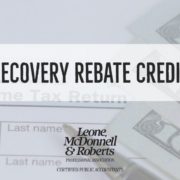1099-K $600 Reporting Threshold Delayed
Form 1099-K is a report of payments a taxpayer received for goods or services during the year from:
- Credit, debit, or stored value cards such as gift cards (payment cards)
- Payment apps or online marketplaces, also called third-party settlement organizations or TPSOs
These organizations are required to fill out Form 1099-K and send copies to the IRS and to you.
The IRS proposed changing the 2023 Form 1099-K reporting threshold for third-party settlement organizations from $20,000 and 200 transactions to $600. However, after receiving much feedback from taxpayers, tax professionals, and payment processors, they have decided to delay the change. While the IRS continues to work to implement the new law, it will treat 2023 as an additional transition year. As a result, reporting will not be required unless the taxpayer receives over $20,000 and has more than 200 transactions in 2023. Taxpayers should be aware that while the reporting threshold remains over $20,000 and 200 transactions for 2023, companies could still issue the form for any amount.
Who Gets The Form?
The Form 1099-K could be sent to anyone who uses payment apps or online marketplaces to accept payments for selling goods or providing services. This includes people with small side businesses, crafters, and other sole proprietors. However, it could also include casual sellers who sold personal things like clothing, furniture, and other household items over the threshold of $600 but actually sold the items at a loss. This complexity contributed to the IRS’s decision to delay the implementation of a lower threshold to provide the agency time to update its operations to make it easier for taxpayers to report the amounts on their forms.
What to do if you receive a 1099-K
The IRS’s Understanding your Form 1099-K webpage provides resources for taxpayers who receive a 1099-K. There is information regarding what to do with a Form 1099-K and what to do if you get a Form 1099-K in error.
Taxpayers who receive a Form 1099-K should review the form, determine if the amount is correct, and determine any deductible expenses associated with the payment that they may be able to claim when they file their taxes.
The payment on a Form 1099-K may be reported in different places on your tax return, depending on what kind of payment it is. For example, someone who received payment as a ride-share driver would report it on a Schedule C, while someone who received payment for rent would report it on a Schedule E.
People who sold personal items must determine if the amounts on their forms were losses or gains. If taxpayers are unsure of the original prices, they can learn more on how to figure out what the items are worth and how to figure their basis in the items.
If a taxpayer sold items at a loss, meaning they paid more for the items than they sold them for, they’ll be able to zero out the payment on their tax return by reporting both the payment and an offsetting adjustment on a Form 1040, Schedule 1. This will ensure people who unnecessarily receive these forms do not pay taxes they do not owe.
What should not be reported
Reporting is not required for personal transactions such as birthday or holiday gifts, sharing the cost of a car ride or meal, or paying a family member or someone else for a household bill. These payments are not taxable and should not be reported on Form 1099-K.
What to expect in 2024
For tax year 2024, the IRS plans for a threshold of $5,000 to phase in the new reporting requirements. It’s important to note that the higher threshold does not affect the actual tax law to report income on your tax return. All income, no matter the amount, is taxable unless it’s excluded by law whether a Form 1099-K is sent or not.
The IRS understands that this is a complicated issue and will continue to provide information on IRS.gov/1099k.










